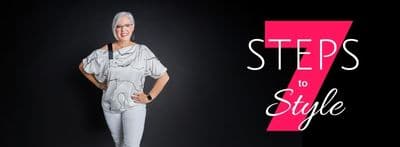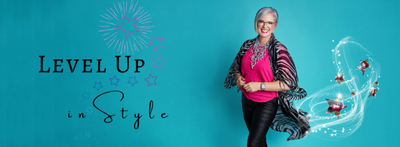
When I’m with a client I like to understand them and why their clothes aren’t working for them. Quite often there are deep seated attitudes to clothes that they’ve never thought about, why they end up wearing clothes that make them look much older or younger than they are, or why they can’t spend more than $60 on any 1 garment or accessory (including shoes). We all have attitudes and beliefs about our worth and what clothes mean to us and their value to our lives.
I have met people who see no value in clothing apart from it covering their naked body. They see clothes as waste, when not purely functional, not understanding how fun and creative it can be to play with clothes and use them to express their personality, and also to use them to create beauty in the world.
Some years ago (though not that many) I could only bargain shop, I found it almost impossible to ever buy a piece of clothing that wasn’t on sale. I was lucky enough to buy a copy of Brenda Kinsel’s Wardrobe Companion and do some of the exercises in it. It’s the list of questions on page 54 that I found most useful, it asks about your shopping and clothing history (from childhood) asking about early experiences with clothes and shopping.
Answering these questions I discovered that when I thought about shopping when I was a teenager, I can still hear my mother’s voice in my head saying “I’m not buying you any shoes, you’ll only grow out of them so it’s a waste” what I internalised was “I’m not buying you anything because you are not worth it” and this led me to be a sales shopper because I didn’t feel worth the full price. Plus during my childhood I was often given either my older brother’s hand-me-downs to wear, or other peoples, many of which I thought were ugly and did not want to wear. Very little was ever spent on my wardrobe (though my parents spent plenty of money on me in other ways when growing up), as they didn’t value clothes they did not see that I did value them.
As an adult, I can now look at the words and attitudes of my mother and understand that I was wrong to feel unworthy, and that it was my mother’s own attitudes having been brought up during the 2nd World War by a mother who lived through the great depression, so she too was taught to be very frugal.
The more I understand about my own style preferences, the easier it is to know what is a great buy, regardless of price tag, and what is a waste (if it’s not me, doesn’t matter how cheap it is, it’s a waste of money). I now feel free from the burden of those beliefs. Doesn’t mean that I don’t still LOVE a bargain!
Have you ever thought about where your clothing attitudes come from? If you haven’t, I highly recommend you working though Brenda’s book, it can help you discover great insights and let you become current with who you are now, not who you were years ago.
You have the right to feel great and gorgeous in your clothes, for your clothes to express your personality, and remember, you are always worth it, no matter what size or shape you are!
Plus, by looking great, you get to make the world a more beautiful place and also have an opportunity to be creative and take care and respect yourself and your body every day. What’s not great about that?














My attitude towards clothes comes from my short stature. I'm 4'11", and have a bit of an ego, so when I couldn't dress myself the way I wanted to, I took it as a challenge and was determined to put together a "perfect" wardrobe.
I approach shopping with the same "petite girl on a mission" attitude, and it's made me almost an obsessive shopper, always looking for that perfect something.
It only helps that both my mother and maternal grandmother were sharp dressers in their day, and deem clothing an important investment.
It's an interesting thought really.
I LOVE a bargain, as I've been through skint times as a child, and of course we all go through skint times as adults too.
If you were to look at me a year ago, I had a couple of pairs of jeans(identical), and a couple of tops. That was it. I had no style.
Yesterday I went into a shop and was asked where I get my clothes as I am always dressed so beautifully. I make all I wear now. For me, that is the be all and end all. I feel as though I look good, and other people obviously agree.
I don't think I have a true style though
So much of your clothes history reminds that of mine, so I don´t have a need to repeat it. Your analysis of the past is also right. I believe I´m right, when I say that you in turn, wish to treat your children differently. I can only hope, that the children of today won´t end up with behaving like our own parents. Having all your wishes come true, is not a perfect solution either.
Metscan, I think you're right, but I also (gingers crossed) think that today's children have seen both sides of the coin and can make a better decision in the future. Having said that, have you seen how many spoilt kids there are today…
And my attitude comes from life in a British university. You learn to be as skint as anything! But all in all a really informative, useful (and great to read!) article!
Clothes make a huge difference. I notice it when I shop (anywhere). Dressed clean, neat, crisp and stylish, I get waited on hand and foot; in my grubbies, I get ignored continuously.
Additionally, if I'm at a meeting, either making a presentation or just attending, and am in a business-like outfit, I'm respected and effective. This doesn't count how the clothes make me feel – if I'm in a fabulous outfit, I feel great, period!
To say that clothes don't matter is just plain foolish and oblivious to the way of the world. It can go overboard to the negative side, but it can also go overboard to the frumpy side.
No matter what your style, shape, environs or circumstances are, clothes matter. If you want to make a certain statement, clothes are and will always be a part of that.
I know a lot of my attitudes stem from my mom's attitude toward clothing. She was a bargain shopper and (understandably) even more so with a kid who would just outgrow everything in a few months.
But I *still* find it hard to spend more than $20 on something. I do, but every time I feel a little guilty. So I have a closet full of cheap crap. It doesn't look good, fit well, or wear well. And even though I have a body that really *should* necessitate lots of tailoring, I don't do it. #1 it adds to the cost and #2 if I'm buying cheap crap in the first place, why double the price to alter if if it's going to fall apart soon anyway?
I realize this is a huge problem in how I think and shop and I'm actively trying to change it. But it's hard. Even when I tell myself "Kelly, you made a personal promise not to buy cheap crap anymore" I still find myself gravitating toward the less expensive stores.
nice post! my attitude is a bit schizophrenical. I have a "punk" attitude from within, and an existencial and creative interest of matching your inner personality, and inner charm, with your outfits. but I also sometimes feel clothes are a bit shallow and want to be myself a lot without bother too much. so I handle clothes like something I do with my right hand, while I look away with my eyes because I feel they can be important to show your personality, but still feel there are more important things in life. I think too much. but this makes me have a very carefully selected wardrobe as every piece is supposed to "be a part of my personality" *rolls eyes* phew. Im picky. also I dont like to buy expensive clothes, it's just not worth it, so I go through the thriftstores although I actually dont like looking for clothes that much, I look at it very practically. I still want to have fine and pretty, personal clothes. it can be very time-consuming so i keep it on the minimum, like go through the stores and internet trading routes one time a month with a very practical mind, sort of like cleaning. i always look for pieces that a) will make my wardrobe more useful and easy-to-use b) are personal and enhances my personal charm and just one's personality overall. 🙂 it's pretty complex! I want to be "me" but I want people to see how pretty I am on the inside on the outside, so there you have it.
..and h&m, topshop, monki etc are a good source of easy-to-use clothing.
During my early childhood (till age 12) money was EXTREMELY tight because my dad was in medical school. I definitely learned to take care of what I have and look for a bargain. Then, I was overweight during my high school and college years so I learned to hate clothes since they never looked good on me and I couldn't wear what my skinny friends wore. I'd buy tons of cheap clothes in a never ending quest to find anything that worked. FINALLY, as I entered the career world, I learned to style my body the way it was and to invest in quality. But it's been only recently that I finally stopped buying clothes in the sizes I hoped to be. And I still love a bargain!
Excellent post! Lots to think about!
I've just been reading "The Thoughtful Dresser" by Linda Grant. Anyone who is interested in why we are so interested in clothes and what the clothes we choose mean would enjoy this.
My mother was a professional seamstress and made almost all of my clothes, including my wedding dress and the dresses for my wedding party (bride's maids and flower girl). She spoiled me rotten, as I was able to select my patterns and fabrics. She also molded my attitude about dressing appropriately for the occasion and putting my best foot forward by looking my best. For me, clothing reflects how I feel about myself and affects how I want to be perceived by others. Now that she's passed away, I have to shop retail like most other people in the world. SIGH